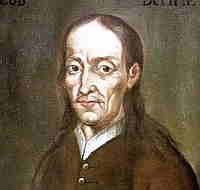SelfDefinition.Org
The Mysterium Magnum
Jacob Boehme
(1575-1624)

Compiler's Comments
Compiled by Martin Euser
Introduction to the electronic edition, 2009
It is with great pleasure that I offer this electronic edition of Jacob Boehme's work "Mysterium Magnum, part one". It was his last great book before his death. It contains an explanation of the allegories found in Genesis. From the alphabetical list of topics, names and places, appended to this part, one can see how much ground Jacob Boehme has covered.
Some of his other books, available on www.scribd.com/
[1. The Life and Doctrines of Jacob Boehme by Franz Hartmann, 1891 : /christian/jacob-boehme/life-and-doctrines/contents.htm ]
There are many themes in common with the theosophical neo-platonic tradition of Ammonius Saccas, Plotinus, Porphyry, Iamblichus and Proclus, as well as with the Kabbalistic tradition. Hierarchies, the emanational generation of Cosmos, angelic kingdoms, trinities, signatura, ideation, duality, transformation can all be found with Boehme, as with the other traditions. Keep in mind that Jacob Boehme uses a very veiled style of writing. He had to do that, in order to survive the narrow-minded world of the fundamentalist Christians, at war with each other at that time. He certainly acknowledged the idea of the potential Christ within the human being (indeed, the New Testament refers to this possibility too), a transformation and realization possible for those oriented to the right way of life.
The main purpose of this edition is to provide a searchable text for the researcher and student of Boehme and enable search-engines to index Boehme's writings, in order to make his texts easily retrievable.
It is a complete text, including the preface of John Sparrow, Jacob Boehme's preface and an extensive alphabetical index of names and places dealt with in this book. The spelling of conjugated verbs has been modernized for easier reading. Italics are from Sparrow's hand.
Boehme's work deserves to be available freely, after about four hundred years. It is still relevant today because it is process oriented, and process philosophy (Whitehead, Peirce, etc.) is getting more attention now, promising some solutions to philosophical problems, like ontological ones, that have plagued science for a long time since quantum mechanics started to be developed. Psychologists can also benefit greatly from the insights into human nature that Boehme offers to the careful reader.
Many more valuable documents (of Boehme and other theosophical-kabbalistic sources, like my ebook on integrative spirituality and holistic science) can be found at my writers corner at scribd.com: www.scribd.com/
Lastly, I wish you an inspirative study of this great work.
— Martin Euser